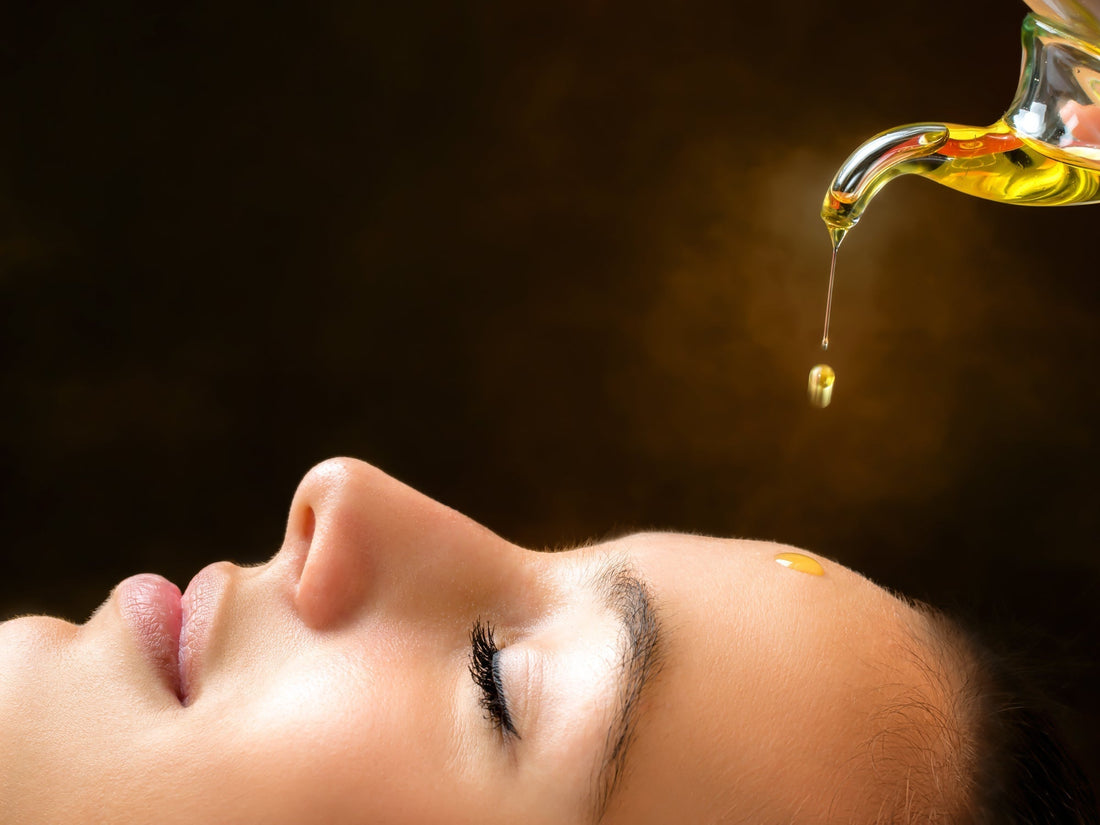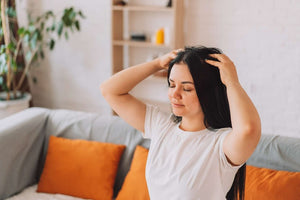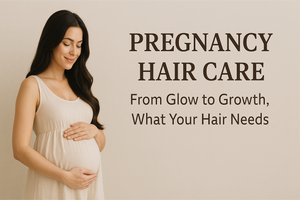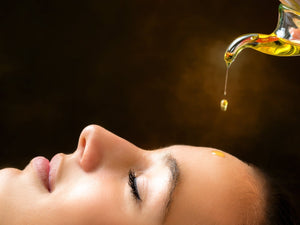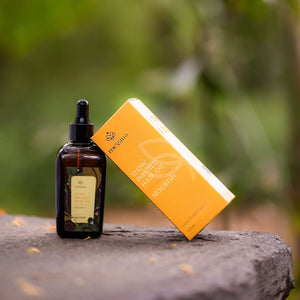We all love massages, don't we? That drizzle of oil pouring on the skin, gentle kneading of muscles, those knots of tension melting away; it's a universally cherished indulgence! But where did this practice evolve from?
The origin of massages goes beyond today's plush spa experiences. This therapeutic practice originated in India, and the massages we know today are extensions of Abhyanga techniques, which have been practised in Ayurveda for centuries.
Massages aren't just stress-busters promoting lightness and calm. Abhyanga offers a whole set of therapeutic treatments, and we're about to explore the health benefits and wonders this ancient practice holds.
From Tradition to Transformation: The Power of Abhyanga Oil
Abhyanga is a Sanskrit term meaning applying oil and massaging the whole body. Ayurveda emphasises Snehan (Oleation)- a smooth, oily, nourishing treatment for balancing Vata. This oleation happens internally (oral healthy fats) and externally (Abhyanga).
This unique therapy manages Vata and related disorders by working on our body's largest organ- the skin. As skin is the main territory of Vata Dosha, what better way to balance Vata than by nourishing its very foundation? The warm Abhyang oil penetrates deeply, creating a protective barrier while delivering therapeutic benefits to the tissues beneath.
Body-Mind Benefits That Stun Scientists Daily
Ayurveda recommends regular Abhyanga Massages for good reason. This practice greatly impacts both physical and mental well-being when using quality Abhyang oil.
Physical Benefits:
- Balances your Vata - Reduces dryness and stabilises energy
- Improves blood circulation - Delivers nutrients throughout the body
- Slows down the ageing process - Maintains skin elasticity and tissue health
- Helps regulate body temperature - Creates optimal thermal balance
Applying warm oil also imparts a radiant glow that comes from deep nourishment. It prevents fluid retention and swelling, particularly in the extremities. Your skin receives deep hydration that commercial moisturisers simply cannot match.
Mental Benefits:
- Uplifts mood - Creates positive emotional states
- Encourages relaxation - Calms the nervous system
- Boosts emotional balance - Reduces mood swings
- Eases tension and reduces stress - Counteracts modern lifestyle pressures
Many practitioners report enhanced mental clarity and cognitive function, likely due to Abhyang Oil’s calming effect on the nervous system. Perhaps most valuable in our sleep-deprived society, it promotes more profound, restful sleep quality.
Crown Treats: Hair Massage Ultimate Secrets
While full-body care is essential, a dedicated Hair Massage deserves special attention in your personalised hair care routine. This practice isn't merely cosmetic—it's deeply therapeutic.
When you massage your scalp, you activate important energy points that influence your entire system. The circular motions stimulate blood circulation to hair follicles, delivering essential nutrients to the roots. This promotes more substantial growth while reducing hair loss.
For optimal hair care results, choose your oil according to your dosha type:
-
Vata types benefit from warming sesame-based formulations
-
Pitta types do best with cooling coconut preparations
-
Kapha types respond well to stimulating mustard blends
Using Abhyang oil enhances the benefits of your massage technique, which should involve gentle yet firm pressure that reaches deep into tissues without causing discomfort. Spend extra time on areas that feel particularly tense, as these often correlate with blocked energy channels that can affect hair health.
Self-Care Ritual: Your Hands, Your Healing
Daily massage? Absolutely! Abhyanga is a simple yet powerful ritual that fits into your routine in minutes. It enhances circulation, calms the mind, and nourishes the body. Here’s how to integrate this ancient self-care practice with the right oil, timing, and technique.
Steps:
- Pick Your Oil: Choose based on your body type: sesame for Vatas (warming), coconut/ghee for Pittas (cooling), and mustard/sunflower for Kaphas (stimulating).
- Set the Right Time: Vatas benefit from morning massage, Pittas find it soothing in the evening, and Kaphas feel energised with a morning routine.
- Prepare & Massage: Warm the oil, create a cosy space, and massage from the toes upward for at least 3 minutes, focusing on tense areas.
- Hair Massage Bonus: A dedicated scalp massage nourishes hair, relaxes the mind, and enhances well-being.
Also Read- Top Ayurvedic Remedies for Hair Loss and Hair Growth
Dosha Wisdom: Oil Soak Timing Matters
Your skin craves balance, and the right oil soak time makes all the difference! Whether your skin thirsts for deep hydration, needs a gentle touch to stay calm, or flourishes with a quick boost, honouring your dosha unlocks proper nourishment. Here’s how:
- Find Your Perfect Soak Time: Vata (Dry, Rough Skin): Give your skin 30-60 minutes to drink in deep hydration. In winter, let the oil work overnight for extra nourishment.
- Pitta (Sensitive, Warm Skin): 20-30 minutes is just right. In summer, a shorter soak (20 min) prevents overheating while keeping your skin balanced.
- Kapha (Oily, Thick Skin): 10-20 minutes is all you need. Use stimulating oils like mustard to activate circulation without heaviness.
Your Hair’s Perfect Match: MeVana’s Ayurvedic Touch
At MeVana, we recognise that your hair's needs are as unique as you are. Our approach begins with an engaging online quiz that examines 84 internal and external factors affecting your hair health. This comprehensive analysis allows our expert doctors to design a personalised hair care plan tailored to you. Beyond personalised product formulations, we provide holistic diet and lifestyle recommendations to promote overall wellness.
By choosing MeVana, you're not just getting personalised hair care products; you're embracing a journey towards restoring balance and vitality to your hair and well-being. Our tailored regimens are crafted to realign you with your natural state of harmony, ensuring your hair receives the nourishment it truly deserves.
Listen to your skin; it knows what it needs! Visit MeVana
FAQs (Frequently Asked Questions)
Q: How does Abhyang oil benefit overall health?
Abhyang oil nourishes the skin, improves circulation, supports joint mobility, and calms the nervous system. Regular use helps balance Vata dosha, reduces stress, enhances sleep quality, and promotes a deep sense of relaxation and well-being.
Q: Can Abhyanga oil massage help with muscle recovery?
Yes, massaging with Abhyanga oil relaxes tense muscles, reduces stiffness, and promotes faster recovery by improving circulation. It helps flush out metabolic waste, making it ideal for post-workout care or relieving everyday body fatigue and soreness.
Q: How does MeVana create personalised hair care solutions?
MeVana tailors hair care through an in-depth quiz that analyses lifestyle, environment, and hair type. This helps formulate customised Ayurvedic oils that align with individual needs, supporting scalp health, nourishment, and overall hair vitality.
Q: How often should Abhyanga oil hair massage be done?
Ayurveda recommends daily Abhyanga for best results, but even 2-3 times a week provides noticeable benefits. Consistency matters more than frequency; adapting it to your routine ensures long-term nourishment, relaxation, and overall balance.
Q: What sets MeVana apart in Ayurvedic hair care?
MeVana combines Ayurvedic wisdom with personalised recommendations, ensuring targeted solutions. By considering unique factors like dosha balance and hair texture, MeVana offers holistic, natural care tailored to enhance hair health without generic, one-size-fits-all approaches.


